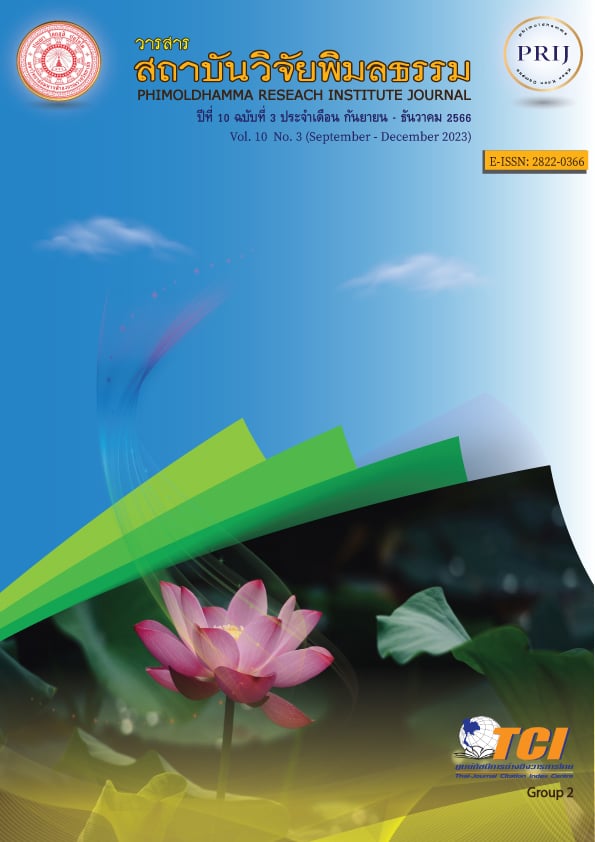การวิเคราะห์กรรมในอรรถกถาธรรมบทตามนิยัตินิยม
คำสำคัญ:
กรรม, ธรรมบท, อรรถกถา, นิยัตินิยมบทคัดย่อ
การวิจัยครั้งนี้ มีวัตถุประสงค์เพื่อ 1) ศึกษากรรมในอรรถกถาธรรมบท 2) ศึกษากรรมตามนิยัตินิยมในทางปรัชญา และ 3) วิเคราะห์กรรมในอรรถกถาธรรมบทตามนิยัตินิยมในทางปรัชญา เป็นงานวิจัยเชิงเอกสาร โดยเก็บรวบรวมข้อมูลจากคัมภีร์พระไตรปิฎก อรรถกถาธรรมบท และเอกสารงานวิจัยที่เกี่ยวข้องกับเรื่องกรรมในอรรถกถาธรรมบทตามนิยัตินิยม จากนั้นได้รวบรวมข้อมูลแล้วนำมาวิเคราะห์ และสังเคราะห์ข้อมูล เพื่อให้ได้องค์ความรู้ตามวัตถุประสงค์
ผลการวิจัยพบว่า
1. กรรมในอรรถกถาธรรมบท เป็นการกระทำที่ประกอบด้วยเจตนาจำแนกออกเป็น 5 ประเภท ได้แก่ 1) จำแนกตามเวลาที่ให้ผล คือกรรมให้ผลในปัจจุบัน กรรมให้ผลในภพหน้า กรรมให้ผลในภพต่อไป และกรรมเลิกให้ผล 2) จำแนกตามการให้ผลตามหน้าที่ คือกรรมที่เป็นตัวนำไปเกิด 3) จำแนกตามความแรงในการให้ผล ได้แก่ กรรมหนัก กรรมที่ทำมามาก เพื่ออธิบายคาถาที่พระพุทธเจ้าตรัสเรื่องกรรมปรากฏให้เห็นอย่างชัดเจนในธรรมบท 4) จำแนกตามลักษณะอาการแสดงออก 5) จำแนกตามคุณภาพของกรรม
2. หลักนิยัตินิยมในทางปรัชญา คือแนวคิดทางปรัชญาที่เชื่อว่า เหตุการณ์ทั้งหมดที่เกิดขึ้นนั้นถูกกำหนดอย่างสมบูรณ์โดยสาเหตุที่เกิดขึ้นก่อนหน้า ซึ่งสภาวะที่เกิดขึ้นในปัจจุบันนั้นถูกกำหนดโดยสภาวะที่เกิดขึ้นก่อนหน้า แต่เนื่องจากแนวคิดนี้ก็เป็นแค่เพียงแนวคิดหนึ่ง ซึ่งในความเป็นจริงเหตุการณ์ที่เกิดขึ้นก่อนหน้านั้น ไม่จำเป็นต้องมีเหตุการณ์ซ้ำรอยเดิมเกิดขึ้นตามมาเสมอไป แต่สามารถเกิดผลลัพธ์ตามมาที่แตกต่างออกไปจากเดิมได้
3. วิเคราะห์กรรมในอรรถกถาธรรมบทตามนิยัตินิยมในทางปรัชญาพบว่า กรรมในอรรถกถาธรรมบทเป็นการกระทำที่มีเจตนา และให้ผลตามเจตนา บุคคลใดทำกุศลกรรมย่อมได้รับสุข มีสุคติเป็นที่ไป บุคคลใดทำอกุศลกรรมย่อมได้รับทุกข์ มีทุคติเป็นที่ไป ทำดีย่อมได้รับผลดี ทำชั่วย่อมได้รับผลชั่ว ทฤษฎีนิยัตินิยมเชื่อว่า การกระทำทุกอย่างของมนุษย์เป็นไปตามโชคชะตาถูกกำหนดไว้ล่วงหน้า นิยัตินิยมเป็นมิจฉาทิฏฐิประเภทหนึ่ง
เอกสารอ้างอิง
เจษฎา ทองรุ่งโรจน์. (2547). พจนานุกรมปรัชญา อังกฤษ-ไทย. กรุงเทพฯ: โบแดง.
บุญเสมอ แดงสังวาลย์. (2553). กรรมกำหนด. (พิมพ์ครั้งที่ 2). กรุงเทพฯ: แสงดาว.
พระพรหมโมลี (วิลาศ ญาณวโร). (2545). กรรมทีปนี เล่ม 1. กรุงเทพฯ: ดอกหญ้า.
มหาจุฬาลงกรณราชวิทยาลัย. (2539). พระไตรปิฎกภาษาไทย ฉบับมหาจุฬาลงกรณราชวิทยาลัย. กรุงเทพฯ: มหาจุฬาลงกรณราชวิทยาลัย.
ลักษณวัต ปาละรัตน์. (2552). ญาณวิทยา (ทฤษฎีความรู้). (พิมพ์ครั้งที่ 2). กรุงเทพฯ: มหาวิทยาลัยรามคำแหง.
เอก ตั้งทรัพย์วัฒนา. (2550). คำและความคิดในรัฐศาสตร์ร่วมสมัย. กรุงเทพฯ: จุฬาลงกรณ์มหาวิทยาลัย.






